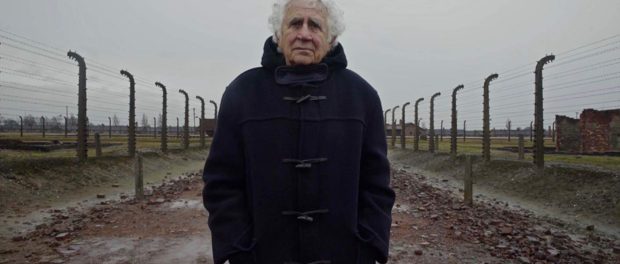The Accountant of Auschwitz: A Cog in the Nazi War Machine
The Accountant of Auschwitz is a new documentary chronicling the trial and crimes of Oskar Gröning who, in 2015, was found guilty of complicity in the murder of over 300,000 human beings at the Auschwitz Nazi death camp. Due to his advanced age, however, the arrest and subsequent trial of Gröning is used by the filmmakers as a means of examining larger moral and ethical issues surrounding the appropriate punitive measures that should be imposed on elderly ex Nazis who committed their crimes during World War II. Are these individuals too old to be punished or should they be finally be brought to justice, something that their victims have been denied for far too long? Directed by Matthew Shoychet and written by Ricki Gurwitz, The Accountant of Auschwitz is a Canadian production that is at times both poignant and heartbreaking.
A variety of the stories told by survivors who lived through the Holocaust are presented as powerful first-person records of the atrocities committed by Nazis such as Oskar Gröning. In the trial, as well as in an earlier televised interview, Gröning willingly provides his own personal account of horrors committed at the death camps. Without emotion, the 94-year-old relates stories such as that of the so-called “crying suitcase,” in which a baby is discovered hidden in its mother’s luggage and the subsequent brutality of that child’s death at the hands of a camp guard.
The film devotes a great deal of time to the experiences of several Auschwitz survivors who find themselves some 70 years after the war travelling back to Germany in order to confront Gröning. Giving testimony at the trial not only forces them to confront horrific memories of the past, but the experience also proves to be a physically difficult task for these senior citizens. To make matters all the worse these victim are further traumatized by the presence of a number of neo-Nazis, members of the alt right movement, and Holocaust deniers gathered outside the courthouse.

Although Oskar Gröning was called the accountant or book keeper of the death camp, the film sets the record straight as to his participation in the murderous activities that took place at Auschwitz and his complicity in the systematic deaths of more than 300,000 Jews. During the war, Gröning was not tucked away in a tiny room dealing with paperwork as his title would suggest. Instead he was in charge of inspecting the countless suitcases and bags filled with all the worldly possessions of the Jewish prisoners brought to the camp. Gröning and his fellow officers raided this luggage and collected anything of value, operating under the belief that the rightful owners didn’t need their belongings any longer and all goods confiscated from were now the rightful property of the Germans. One of the strengths of The Accountant of Auschwitz is the way in which the filmmakers have succeeded in providing scope to the documentary by giving it a broad historical perspective. The Nuremberg trials that took place just after the war are revealed to have been largely ineffectual in terms of dealing out some kind of justice for the victims of the Nazi regime. All too often, these war criminals were tried by judges who themselves had been Nazi party members and in the majority of cases, the defendants received brief jail sentences or were acquitted.

With the deportation of Jakiw Palij, a Nazi concentration camp guard recently expelled from the U.S. and returned to Germany, the issues raised in this film are particularly timely. The filmmakers allow many differing opinions and points of view to be heard throughout the film but provide no definitive answers in regards to how to go about reconciling the horrors of the past. The Accountant of Auschwitz is a powerful documentary that serves to cast a spotlight not only on the worst crimes perpetrated by the Nazis but also the tremendous resilience and strength of those who survived the Holocaust.
The Accountant of Auschwitz is now playing at Cinema du Parc.




